Analyzing the Evolution of Russian Foreign Policy: 1990s to Present
VerifiedAdded on 2020/02/05
|7
|674
|62
Essay
AI Summary
This essay provides an analysis of Russian foreign policy, beginning with the post-Soviet era and the influence of figures like Putin and Lavrov. It examines the evolution of Russian foreign policy, focusing on key periods from the 1990s to the present. The essay identifies three major policy orientations: pragmatic statists, liberal westernizers, and fundamental eurasianists, and discusses their impact on Russia's international relations. It explores how Russia has adapted its foreign policy to align with its economic and national interests, including its approach to Europe and the United States. The conclusion emphasizes Russia's growing global influence and its need to establish strong relationships with other countries. The essay uses sources like books and journals to support its analysis.
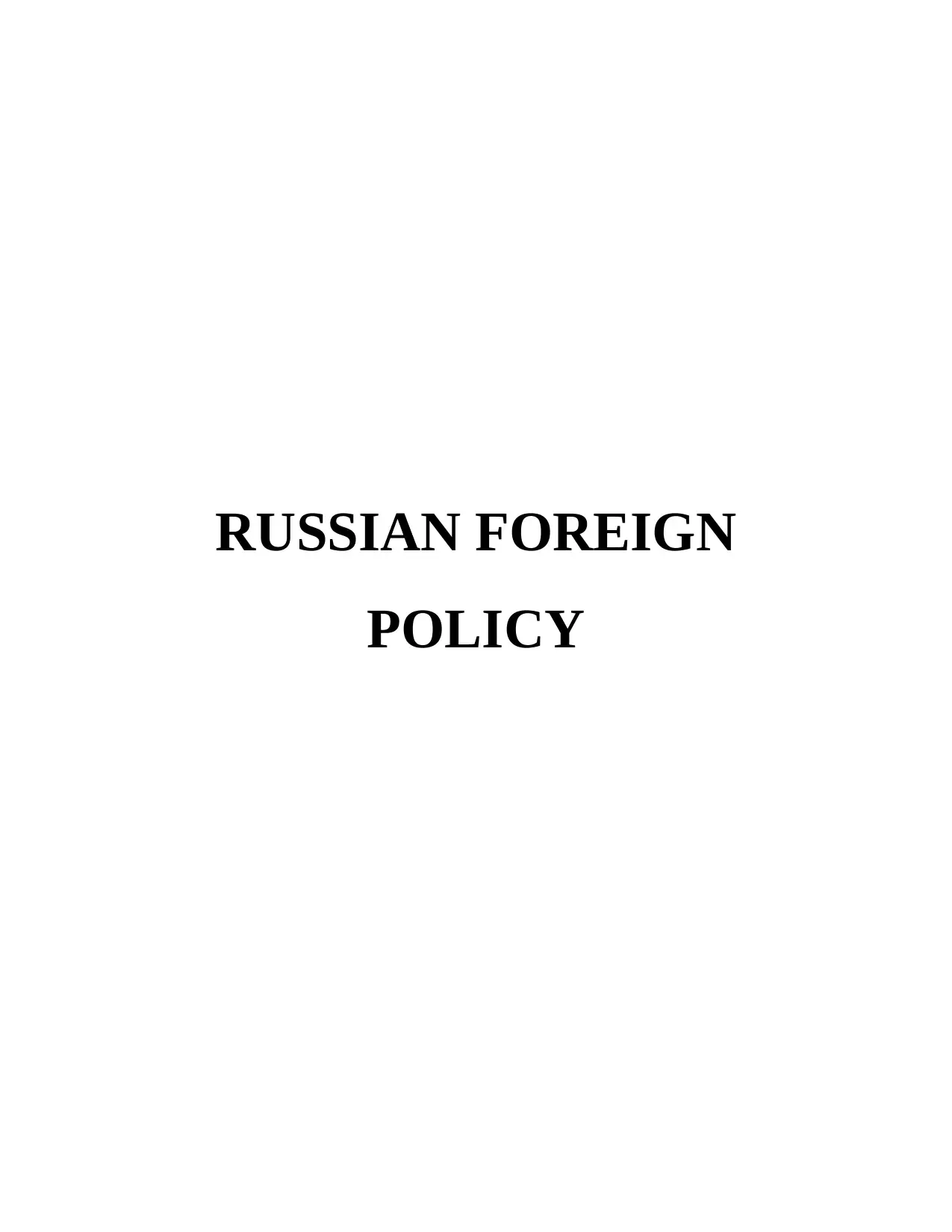
RUSSIAN FOREIGN
POLICY
POLICY
Paraphrase This Document
Need a fresh take? Get an instant paraphrase of this document with our AI Paraphraser
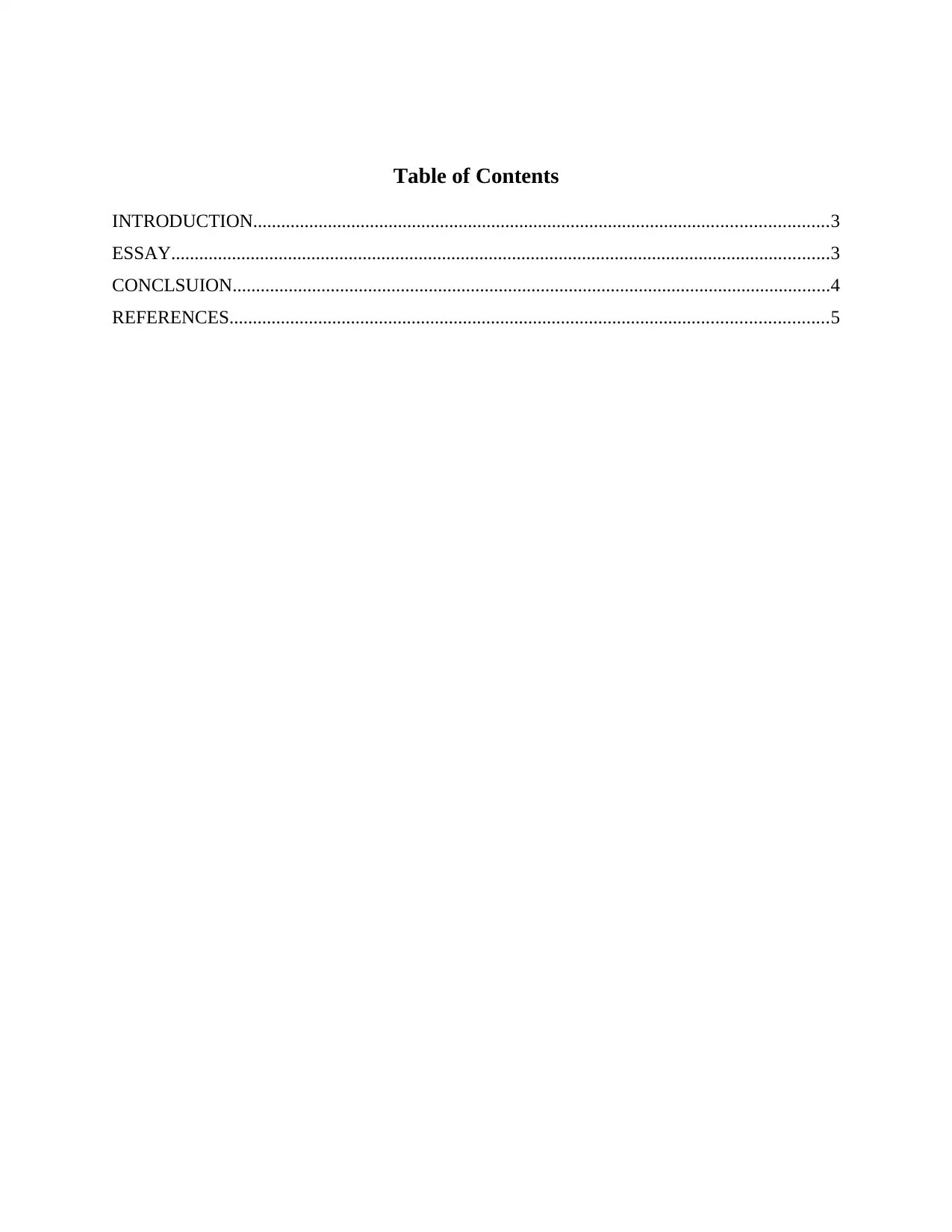
Table of Contents
INTRODUCTION...........................................................................................................................3
ESSAY.............................................................................................................................................3
CONCLSUION................................................................................................................................4
REFERENCES................................................................................................................................5
INTRODUCTION...........................................................................................................................3
ESSAY.............................................................................................................................................3
CONCLSUION................................................................................................................................4
REFERENCES................................................................................................................................5
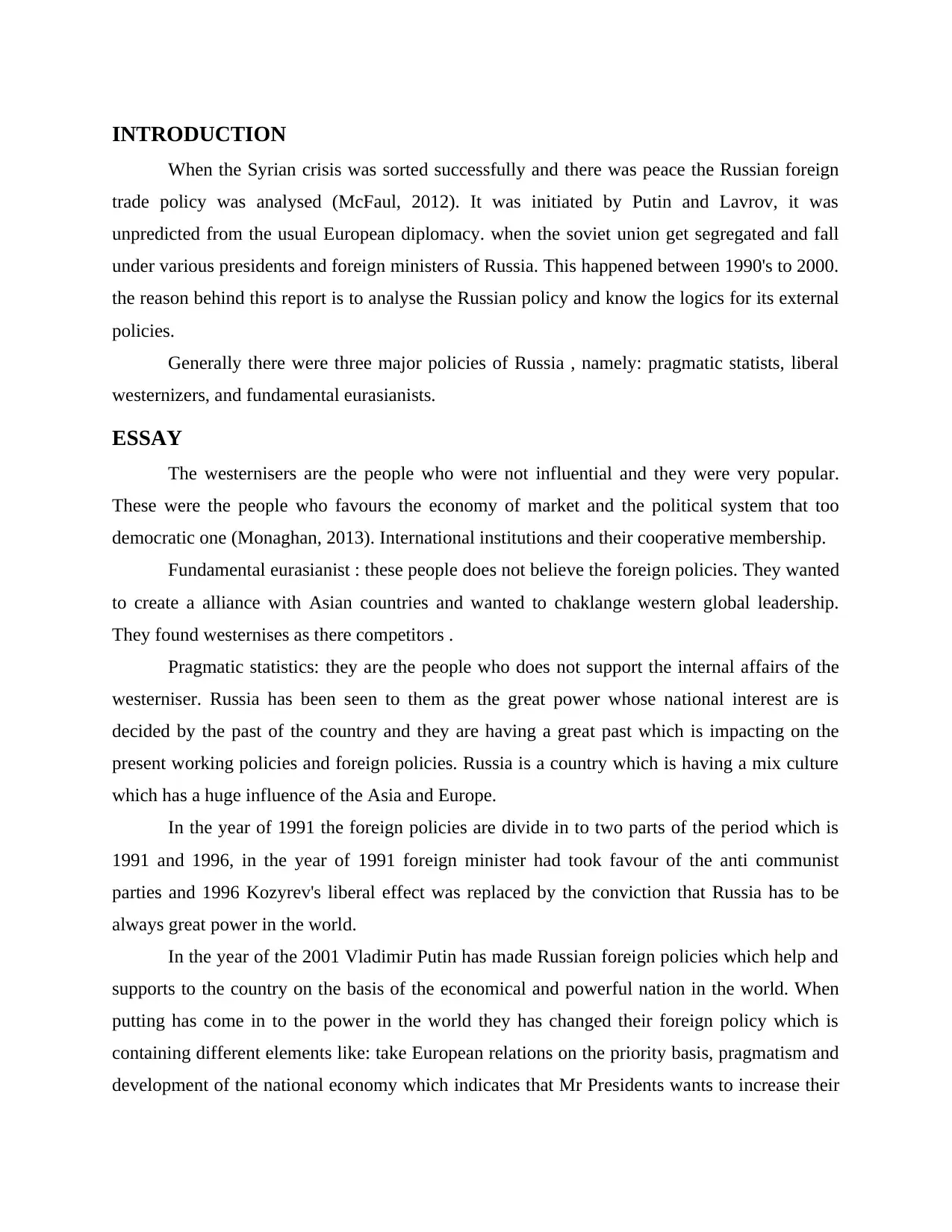
INTRODUCTION
When the Syrian crisis was sorted successfully and there was peace the Russian foreign
trade policy was analysed (McFaul, 2012). It was initiated by Putin and Lavrov, it was
unpredicted from the usual European diplomacy. when the soviet union get segregated and fall
under various presidents and foreign ministers of Russia. This happened between 1990's to 2000.
the reason behind this report is to analyse the Russian policy and know the logics for its external
policies.
Generally there were three major policies of Russia , namely: pragmatic statists, liberal
westernizers, and fundamental eurasianists.
ESSAY
The westernisers are the people who were not influential and they were very popular.
These were the people who favours the economy of market and the political system that too
democratic one (Monaghan, 2013). International institutions and their cooperative membership.
Fundamental eurasianist : these people does not believe the foreign policies. They wanted
to create a alliance with Asian countries and wanted to chaklange western global leadership.
They found westernises as there competitors .
Pragmatic statistics: they are the people who does not support the internal affairs of the
westerniser. Russia has been seen to them as the great power whose national interest are is
decided by the past of the country and they are having a great past which is impacting on the
present working policies and foreign policies. Russia is a country which is having a mix culture
which has a huge influence of the Asia and Europe.
In the year of 1991 the foreign policies are divide in to two parts of the period which is
1991 and 1996, in the year of 1991 foreign minister had took favour of the anti communist
parties and 1996 Kozyrev's liberal effect was replaced by the conviction that Russia has to be
always great power in the world.
In the year of the 2001 Vladimir Putin has made Russian foreign policies which help and
supports to the country on the basis of the economical and powerful nation in the world. When
putting has come in to the power in the world they has changed their foreign policy which is
containing different elements like: take European relations on the priority basis, pragmatism and
development of the national economy which indicates that Mr Presidents wants to increase their
When the Syrian crisis was sorted successfully and there was peace the Russian foreign
trade policy was analysed (McFaul, 2012). It was initiated by Putin and Lavrov, it was
unpredicted from the usual European diplomacy. when the soviet union get segregated and fall
under various presidents and foreign ministers of Russia. This happened between 1990's to 2000.
the reason behind this report is to analyse the Russian policy and know the logics for its external
policies.
Generally there were three major policies of Russia , namely: pragmatic statists, liberal
westernizers, and fundamental eurasianists.
ESSAY
The westernisers are the people who were not influential and they were very popular.
These were the people who favours the economy of market and the political system that too
democratic one (Monaghan, 2013). International institutions and their cooperative membership.
Fundamental eurasianist : these people does not believe the foreign policies. They wanted
to create a alliance with Asian countries and wanted to chaklange western global leadership.
They found westernises as there competitors .
Pragmatic statistics: they are the people who does not support the internal affairs of the
westerniser. Russia has been seen to them as the great power whose national interest are is
decided by the past of the country and they are having a great past which is impacting on the
present working policies and foreign policies. Russia is a country which is having a mix culture
which has a huge influence of the Asia and Europe.
In the year of 1991 the foreign policies are divide in to two parts of the period which is
1991 and 1996, in the year of 1991 foreign minister had took favour of the anti communist
parties and 1996 Kozyrev's liberal effect was replaced by the conviction that Russia has to be
always great power in the world.
In the year of the 2001 Vladimir Putin has made Russian foreign policies which help and
supports to the country on the basis of the economical and powerful nation in the world. When
putting has come in to the power in the world they has changed their foreign policy which is
containing different elements like: take European relations on the priority basis, pragmatism and
development of the national economy which indicates that Mr Presidents wants to increase their
⊘ This is a preview!⊘
Do you want full access?
Subscribe today to unlock all pages.

Trusted by 1+ million students worldwide
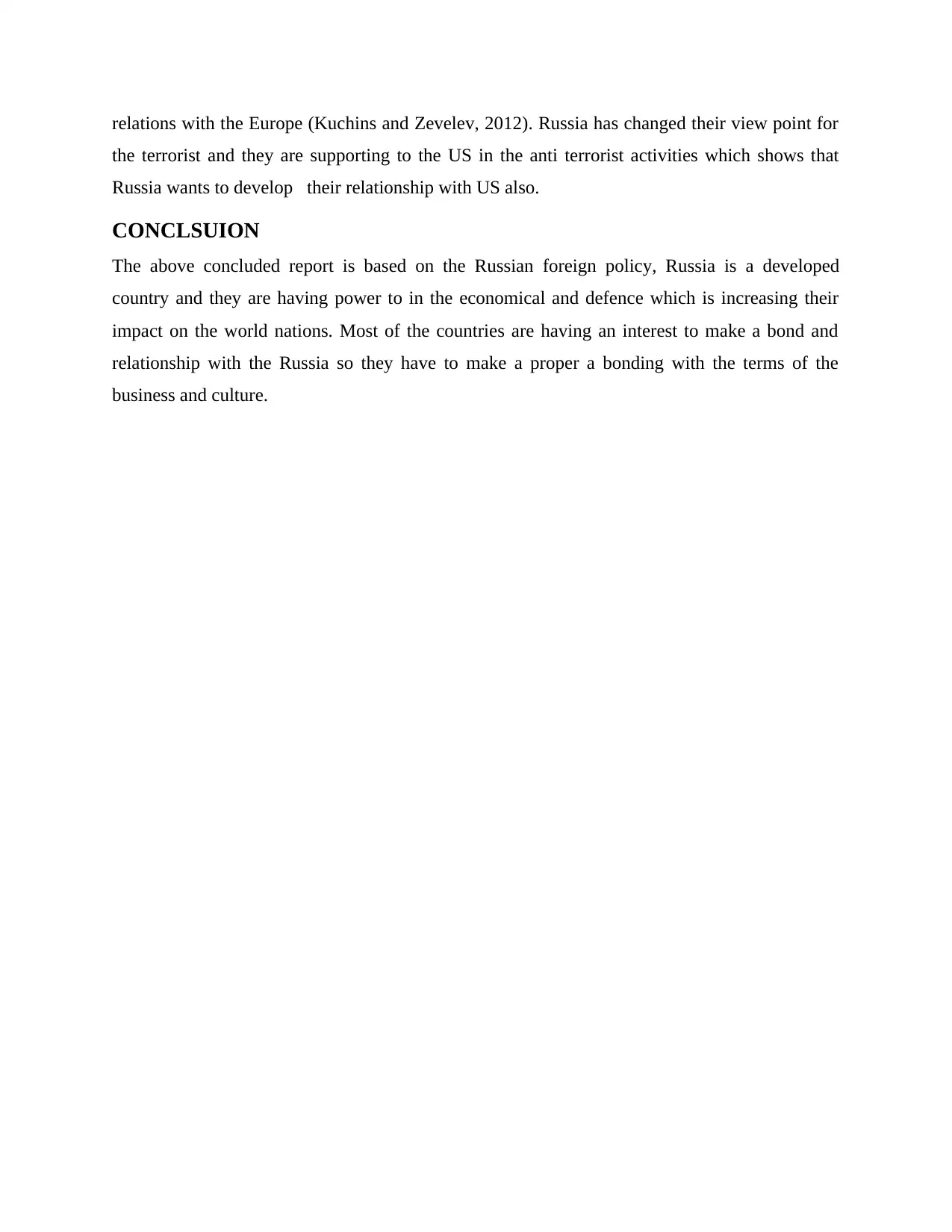
relations with the Europe (Kuchins and Zevelev, 2012). Russia has changed their view point for
the terrorist and they are supporting to the US in the anti terrorist activities which shows that
Russia wants to develop their relationship with US also.
CONCLSUION
The above concluded report is based on the Russian foreign policy, Russia is a developed
country and they are having power to in the economical and defence which is increasing their
impact on the world nations. Most of the countries are having an interest to make a bond and
relationship with the Russia so they have to make a proper a bonding with the terms of the
business and culture.
the terrorist and they are supporting to the US in the anti terrorist activities which shows that
Russia wants to develop their relationship with US also.
CONCLSUION
The above concluded report is based on the Russian foreign policy, Russia is a developed
country and they are having power to in the economical and defence which is increasing their
impact on the world nations. Most of the countries are having an interest to make a bond and
relationship with the Russia so they have to make a proper a bonding with the terms of the
business and culture.
Paraphrase This Document
Need a fresh take? Get an instant paraphrase of this document with our AI Paraphraser
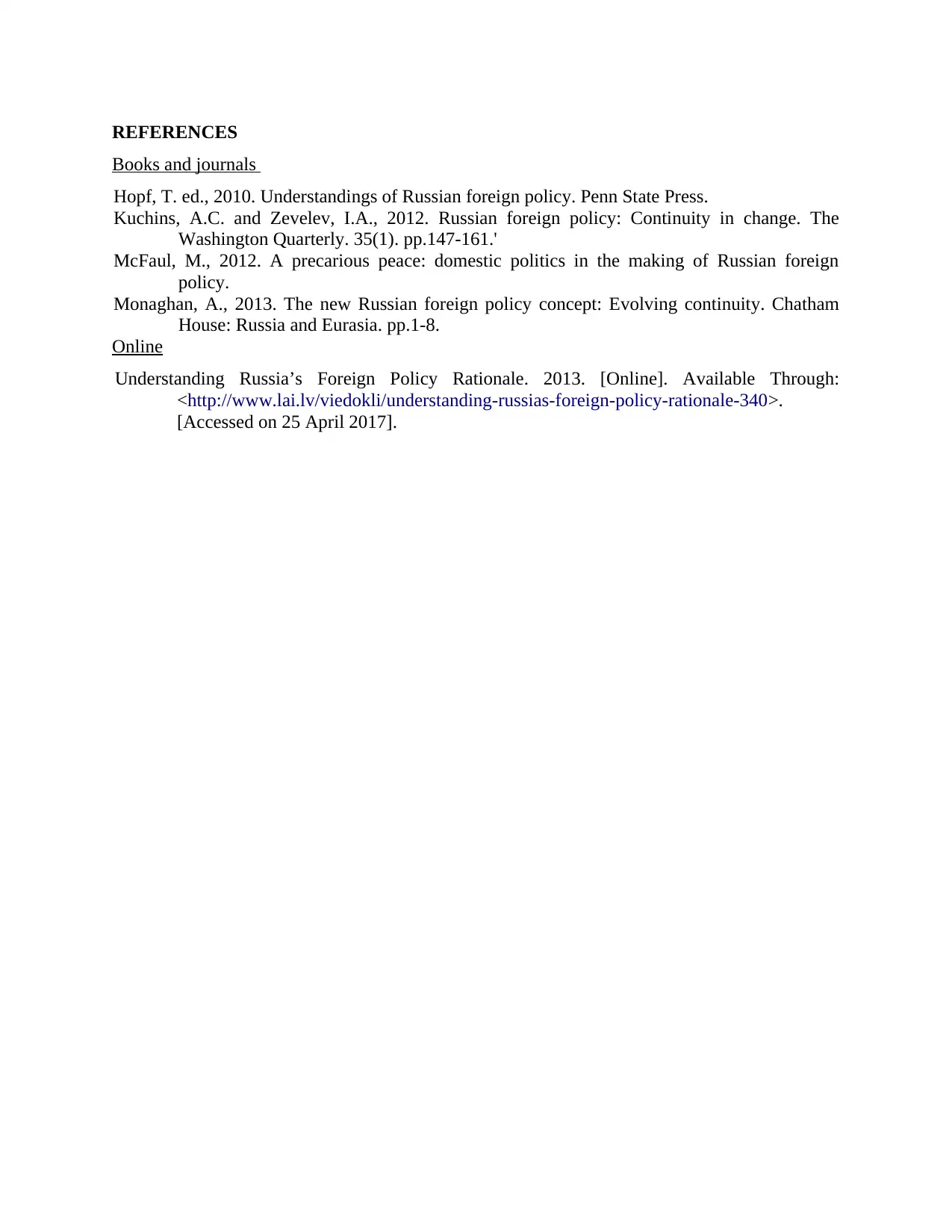
REFERENCES
Books and journals
Hopf, T. ed., 2010. Understandings of Russian foreign policy. Penn State Press.
Kuchins, A.C. and Zevelev, I.A., 2012. Russian foreign policy: Continuity in change. The
Washington Quarterly. 35(1). pp.147-161.'
McFaul, M., 2012. A precarious peace: domestic politics in the making of Russian foreign
policy.
Monaghan, A., 2013. The new Russian foreign policy concept: Evolving continuity. Chatham
House: Russia and Eurasia. pp.1-8.
Online
Understanding Russia’s Foreign Policy Rationale. 2013. [Online]. Available Through:
<http://www.lai.lv/viedokli/understanding-russias-foreign-policy-rationale-340>.
[Accessed on 25 April 2017].
Books and journals
Hopf, T. ed., 2010. Understandings of Russian foreign policy. Penn State Press.
Kuchins, A.C. and Zevelev, I.A., 2012. Russian foreign policy: Continuity in change. The
Washington Quarterly. 35(1). pp.147-161.'
McFaul, M., 2012. A precarious peace: domestic politics in the making of Russian foreign
policy.
Monaghan, A., 2013. The new Russian foreign policy concept: Evolving continuity. Chatham
House: Russia and Eurasia. pp.1-8.
Online
Understanding Russia’s Foreign Policy Rationale. 2013. [Online]. Available Through:
<http://www.lai.lv/viedokli/understanding-russias-foreign-policy-rationale-340>.
[Accessed on 25 April 2017].

⊘ This is a preview!⊘
Do you want full access?
Subscribe today to unlock all pages.

Trusted by 1+ million students worldwide

1 out of 7
Related Documents
Your All-in-One AI-Powered Toolkit for Academic Success.
+13062052269
info@desklib.com
Available 24*7 on WhatsApp / Email
![[object Object]](/_next/static/media/star-bottom.7253800d.svg)
Unlock your academic potential
Copyright © 2020–2026 A2Z Services. All Rights Reserved. Developed and managed by ZUCOL.





